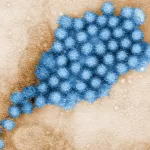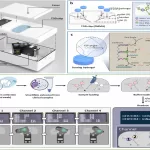Researchers at Washington University School of Medicine make groundbreaking strides in treating Batten Disease and related conditions.
Researchers at Washington University School of Medicine in St. Louis have made a breakthrough in understanding the devastating effects of Batten disease, a rare and fatal neurodegenerative disorder in children, which also severely impacts the gastrointestinal (GI) system. Led by Jonathan D. Cooper, Ph.D., professor of pediatrics, the team has demonstrated that gene therapy may offer significant relief for bowel issues in mice suffering from Batten disease, potentially extending their lifespan.
Batten disease, also known as neuronal ceroid lipofuscinosis, is a fatal genetic disorder that primarily affects the brain, leading to symptoms such as blindness, seizures, and dementia. However, the condition also causes debilitating constipation and other severe bowel issues, which had long been overlooked until parents of children with Batten disease raised their concerns.
“We are all miserable when we can’t poop,” said Cooper, who has devoted his career to studying rare diseases affecting children’s brains. Cooper’s new findings highlight how Batten disease also damages the enteric nervous system, which governs bowel function. His research reveals that in mouse models of the disease, neurons in the bowel wall degenerate, mirroring the neurodegeneration that occurs in the brain and spinal cord.
Collaborating with experts such as Robert O. Heuckeroth, MD, Ph.D., from the Children’s Hospital of Philadelphia, Cooper’s team discovered that gene therapy targeted at the bowel reduced enteric neuron degeneration and alleviated bowel-related symptoms. In their study, which was published in Science Translational Medicine, they found that the gene therapy not only improved bowel function but also extended the lifespan of the mice by preventing the degeneration of nerve cells in the bowel.
“This represents a novel and highly promising method for treating gastrointestinal issues in children with Batten disease,” said Cooper. “The key takeaway is that these GI problems are not secondary to brain degeneration—they occur directly in the bowel itself.”
Batten disease, while rare, is devastating, affecting approximately three in every 100,000 children in the United States. The disease causes an accumulation of waste within cells due to a lack of a crucial enzyme. This results in progressive brain damage and early death, usually before the age of 12. Cooper’s research into gene therapy comes after years of listening to parents of affected children, who not only voiced concerns about the neurological symptoms but also about the severe constipation and other digestive issues that make their children’s lives even more difficult.
One such parent, Tracy VanHoutan, whose children suffered from Batten disease, has been instrumental in advocating for research into the condition. “Dr. Cooper listened to our concerns and understood the importance of addressing the daily challenges that children with Batten disease face,” VanHoutan explained. His advocacy work continues to inspire advancements in the understanding and treatment of Batten disease.
Cooper and Heuckeroth’s collaborative research revealed that the degeneration of nerve cells in the bowel occurred in parallel with brain degeneration in Batten disease. The treatment strategy involved delivering a working copy of the missing enzyme via gene therapy to the bowel of newborn mice, preventing nerve cell loss and preserving bowel function. In addition to improved bowel motility, the treated mice lived significantly longer than untreated mice, showing the potential of gene therapy in treating other similar neurodegenerative diseases.
The implications of this work extend beyond Batten disease. Researchers are now applying their findings to other neurodegenerative disorders that affect both the brain and GI system, such as mucopolysaccharidoses—another group of rare diseases caused by enzyme deficiencies.
Moving forward, the team plans to test simultaneous gene therapy for both the brain and bowel, which they believe will yield the most effective results. Cooper and Heuckeroth are optimistic that this novel approach could eventually lead to improved treatments for not only Batten disease but also other rare inherited diseases that cause gastrointestinal distress and neurological decline.
The research, supported by families affected by Batten disease, offers a glimmer of hope for children suffering from these devastating conditions and could revolutionize how rare neurodegenerative diseases are treated in the future.
For more information, see the study published in Science Translational Medicine by Ewa Ziółkowska et al. (2025). DOI: 10.1126/scitranslmed.adj1445.











